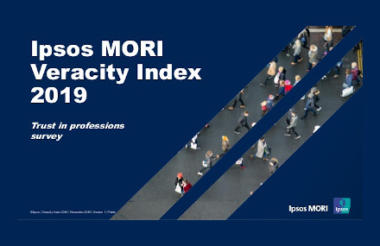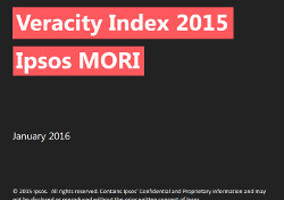Forty five per cent of the public say that they trust charity chief executives to tell the truth, according to the latest Ipsos Mori Veracity Index.
Over the last five years, the percentage of people saying that they trust charity chief executives has fluctuated slightly between 45 and 50 per cent.
But, for the first time in five years, the “net trust” score, where the percentage of people who do not trust charity is subtracted from the percentage that do, has fallen into negative figures. It now stands at minus three, down from plus two last year and plus five the year before.
Over 1,000 people were asked their views on the trustworthiness of a range of professions. Nurses were the highest rated profession, with 95 per cent of people trusting them to tell the truth, followed by doctors (93 per cent) and dentists (90 per cent).
Politicians were least trusted with just 14 per cent saying that they trust them to tell the truth, followed by advertising executives and government ministers on 17 per cent.
Journalists were trusted by 26 per cent of respondents and the ordinary man/woman on the street is trusted by 65 per cent.
‘Cause for reflection not alarm’
Sector bodies said that the while minor fluctuations were no cause for alarm, charity leaders should be thinking about how they ensure they hold themselves to high ethical standards.
Kristiana Wrixon, head of policy at ACEVO, said: “This poll is cause for reflection but not necessarily alarm. We know from our own research with nfpSynergy this year that when asked about trust in charities in general, people expressed lower levels of trust than when asked about individual charities one-by-one. We also found that the most trusted charities are ones that provide services, and the least trusted are those that challenge the status quo.
“Charity leaders should, and mostly do, act transparently, responsibly and in line with their charitable objectives. They should be confident that they are trusted by the community they serve and work alongside. Trust, especially in uncertain times, can be volatile and ACEVO will continue to champion the work of civil society CEOs to build trust in the role of charity in our society.”
Aidan Warner, communications manager at NCVO, said: “We shouldn't worry about slight year-on-year changes in the percentages but we should worry that overall this is not nearly as high as we'd like it to be.”
Remain voters and the university-educated are more trusting of charity leaders
Ipsos Mori segmented the findings based on political allegiances and education attainment.
People who said they were Labour Party supporters were more likely than Conservative Party supporters to trust charity chief executives (54 per cent vs 36 per cent).
Those who voted remain in the referendum on the European Union were also more likely than leave voters to trust charity chief executives (51 per cent vs 34 per cent).
Those with a university degree were more trusting of charity leaders than those without (55 per cent vs 31 per cent).
|
Related articles











